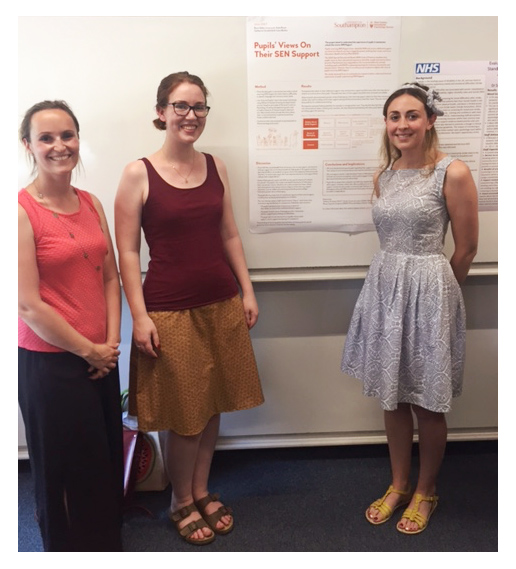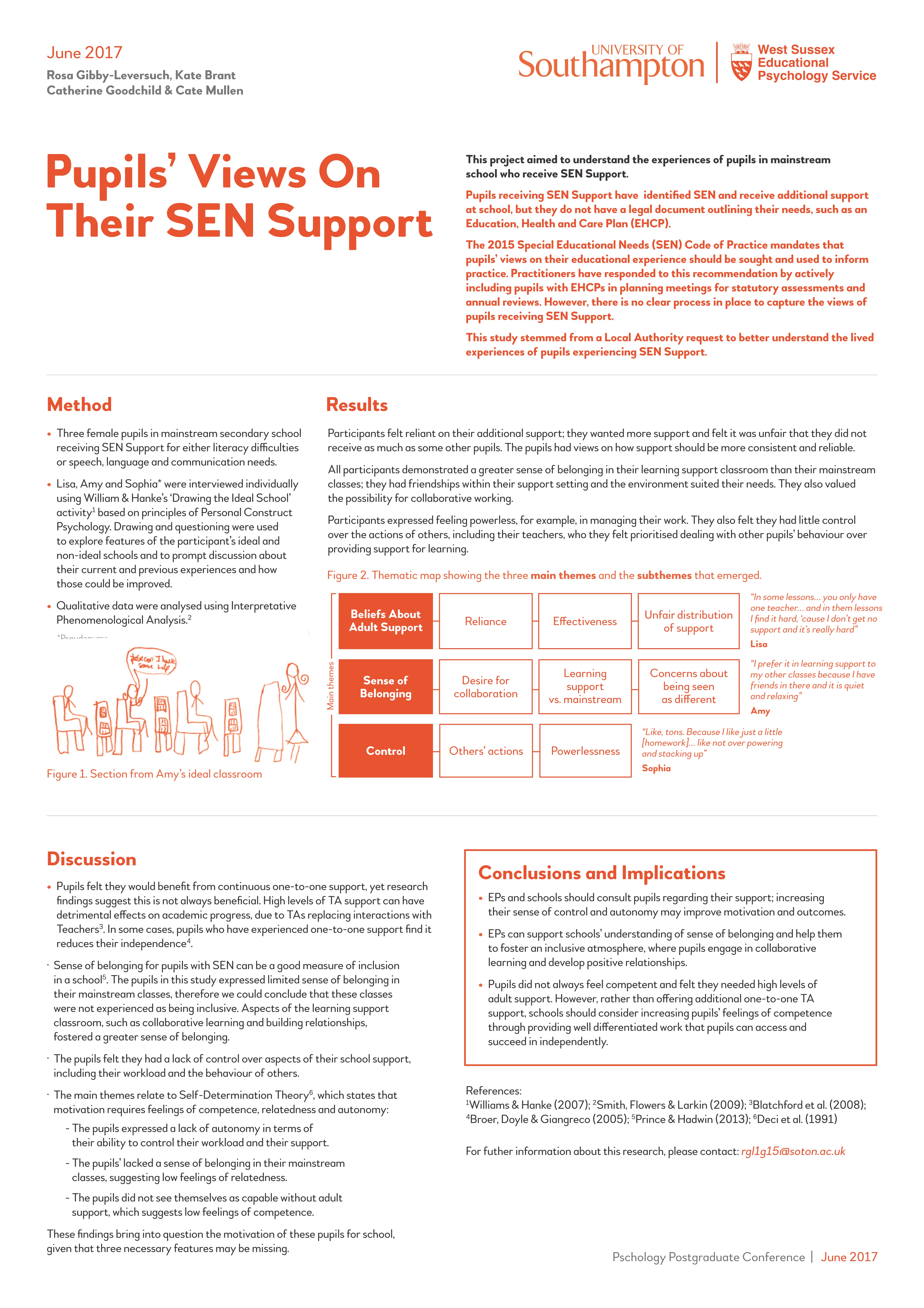Assignment type: Research Project (Small Scale Research Project, Year 1)
Authors: Kate Brant, Rosa Gibby-Leversuch, Catherine Goodchild, Cate Mullen and Hanna Kovshoff
Submitted: Spring 2017
The 2015 Special Educational Needs (SEN) Code of Practice mandates that pupils’ views on their educational experience should be sought and used to inform practice. Practitioners have responded to this recommendation by actively including pupils in planning meetings for statutory assessments and annual reviews. However, there is no clear process in place to capture the views of pupils with SEN who receive support at school but do not have an Education, Health and Care Plan (EHCP) or Statement of SEN.

The poster for this research study won second place at the 2017 Southampton School of Psychology Post Graduate Research Conference.
The current small scale research project aimed to understand the experiences of pupils in mainstream school who receive SEN Support. Three female participants, aged 13-14, were recruited from a mainstream secondary school in the South of England. Participants were receiving SEN support for either specific literacy difficulties or speech, language and communication needs. Participants were interviewed individually using the ‘Drawing the Ideal School’ procedure developed by Williams & Hanke (2007) and based on the principles of Personal Construct Psychology. This activity uses drawing and questioning to explore various features of the participant’s ideal and non-ideal school as well as prompting discussion about participants’ current and previous experiences and how those could be improved.
Qualitative data were analysed using Interpretative Phenomenological Analysis (IPA; Smith, Flowers and Larkin, 2009). IPA aims to explore how participants make sense of their personal and social world. Three main themes emerged: (1) Beliefs about adult support, (2) Control and (3) Sense of belonging (SoB). See Table 1 for a full list of themes and subthemes, by participant.
Table 1: Developed themes and subthemes
| Theme | Subtheme | Participants |
|---|---|---|
| Beliefs about adult support |
Reliance on additional support Effectiveness of support staff Feelings of unfairness surrounding teacher support |
Lisa, Sophia Lisa, Amy, Sophia Lisa, Sophia, Amy |
| Control | Others’ actions Powerlessness |
Lisa, Sophia, Amy Lisa, Sophia |
| Sense of belonging |
Learning support vs. classroom Concern about being seen as different Desire for reciprocity |
Sophia, Amy Lisa, Sophia Lisa, Amy and Sophia |
Participants held beliefs about the additional support that they and others receive, but had limited understanding of how that support was allocated. Distribution of support was sometimes perceived as unfair; Lisa and Sophia felt more one-to-one support in lessons would benefit them. However, on occasion, Lisa and Amy felt that support staff were not sufficiently prepared for their sessions, meaning their support was ineffective. Additionally, participants felt that teachers were often busy with other priorities, such as managing behaviour, which prevented them from focusing on teaching and providing support that participants required. The combination of teacher priorities and the challenging behaviour of some peers led to participants feeling a sense of powerlessness and lack of control over their adult support in lessons. Control was identified as a theme because participants felt they did not have control over other pupil’s behaviour, especially negative behaviour towards themselves or others. Both Amy and Lisa discussed their experiences of bullying. They described feeling powerless in these situations as they relied on others to intervene and support them.
A theme shared by all participants was a lack of Sense of Belonging (SoB) in their mainstream class. They did not feel like they had positive relationships in their mainstream classes and were often concerned about being negatively judged for the aspects of learning they found difficult. Conversely, participants described an increased SoB in their learning support classroom as they could relate to other children in that class, often had friends and were involved in collaborative learning.
The three themes derived from these interviews parallel work conducted by Webster and Blatchford (2014) who conducted a study with primary school children who had a statement of SEN. One of their main findings suggested that pupils experienced a high level of separation from others in their class. This supports the SoB theme derived in this study, as participants also experienced a sense of social isolation from their mainstream peers. Moreover, they found that TAs often had responsibility for the participants’ learning and that TAs were not always given enough time to plan lessons with teachers. In the present study, this is captured in the ‘beliefs about adult support’ theme as participants sometimes felt that TAs were not sufficiently aware of the learning objectives or lesson content, leading to less effective additional support.
The findings can also be thought of in terms of self-determination theory (Deci & Ryan, 2000), which describes optimal learning and positive wellbeing when the psychological needs of competence, relatedness and autonomy are being met by the learning environment. The participants in the present study expressed low feelings of autonomy (control) in terms of lack of power to influence the actions of others and having limited control over school experiences. Concerns about being judged and lack of confidence in abilities suggests low perceived competence. All participants discussed experiencing lowered SoB, particularly in terms of peer relationships, when in their mainstream classes. Lack of SoB in their mainstream classes may indicate low feelings of relatedness, but this is something that participants felt could be improved through increased opportunities for collaborative working with peers. Therefore, further developing integrative practices, through collaborative learning, could increase opportunities for reciprocal relationships and improve relatedness.
While it is important to highlight that this study is small scale and based on the experiences of three young people experiencing SEN support, it remains that important lessons can be derived from the findings which may be used to inform future practice. We would like to propose the following recommendations based on the findings from this work: (1) SEN support could be made more effective through better communication between teaching and support staff. As students were impacted by frequent changes in support staff, perhaps, where possible, better preparation for and communication about the staff change could be provided to pupils. (2) There is a role for EPs to help to develop the participating schools’ understanding that SoB might be low for some pupils in support classes and that this may have implications for pupil cognitive, behavioural and emotional outcomes. Training in the importance of developing a SOB or the provision of some informative material (such as information leaflets) or relevant research (Prince & Hadwin, 2013) could be implemented. (3) EPs may wish to highlight to SENCOs and senior leaders the importance of meaningfully consulting pupils at the SEN support level regarding their SEN support through planning meetings, and the potential positive impact this may have on pupil’s wellbeing and learning outcomes.

